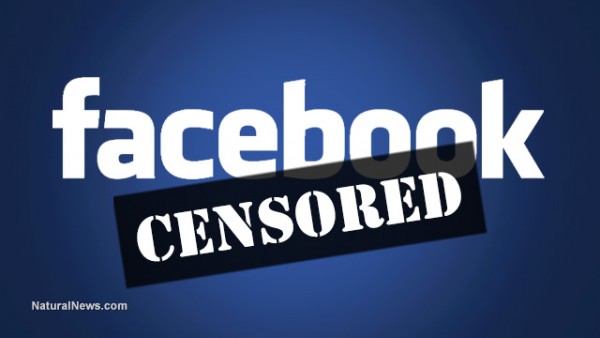During the election, Americans who were simply looking for information got screwed by the media. The propaganda was so thick and the fake polls were so numerous that people were reeling in shock when Hillary Clinton actually ended up losing the election. Heck, I was stunned myself, and I had even written an article about my suspicion that the polls were fake.
(Article republished from DaisyLuther.com)
The establishment media misquoted, edited video clips to tell a different story, and made their bias so blatant that one site even put an editorial disclaimer on every article that mentioned Donald Trump, denouncing him as a xenophobic, homophobic blah blah blah. They created a monster in Trump, and now people are out there destroying cities and blocking ambulances because of it. As Noam Chomsky wrote in his brilliant book, Language and Politics:
You don’t have any other society where the educated classes are so effectively indoctrinated and controlled by a subtle propaganda system – a private system including media, intellectual opinion forming magazines and the participation of the most highly educated sections of the population. Such people ought to be referred to as “Commissars” – for that is what their essential function is – to set up and maintain a system of doctrines and beliefs which will undermine independent thought and prevent a proper understanding and analysis of national and global institutions, issues, and policies.
Despite the bias and the mindless followers breathlessly tweeting every fear-laced, dishonest word, Donald Trump still ended up winning the election. According to Mac Slavo of SHTFplan, that is because of the power of alternative media.
One report after another being disseminated by what left-leaning pundits call “fake news websites” has been confirmed as accurate, proving that there was a concerted effort to stifle open discourse and real journalism.
Hillary Clinton made mention of it in her Deplorables speech, warning that a lot of fake information was being released through purported “racist” web sites across the web.
And if she had her way, no one would have ever read anything but positive information about her, while everything else was disappeared Orwellian-style, never to reach the masses that eventually elected Donald Trump to the Presidency.
What this year’s Presidential election has proven is that alternative media is a force to be reckoned with, and the establishment is scared shitless.
But they won’t let it happen again.
War has been declared – a war on fake news.
But guess who they’re really coming for?
Google and Facebook are on a mission to rid the world of “fake news”
But instead of starting with the New York Times, whose publisher basically admitted that their coverage of the election was dishonest, they’re targeting alternative media – the very people who were the ones out there telling the truth during the election.
In fact, in a quote that is rich with irony, the aforementioned NY Times said:
Google kicked off the action on Monday afternoon when the Silicon Valley search giant said it would ban websites that peddle fake news from using its online advertising service. Hours later, Facebook, the social network, updated the language in its Facebook Audience Network policy, which already says it will not display ads in sites that show misleading or illegal content, to include fake news sites.
“We have updated the policy to explicitly clarify that this applies to fake news,” a Facebook spokesman said in a statement. “Our team will continue to closely vet all prospective publishers and monitor existing ones to ensure compliance.”
Taken together, the decisions were a clear signal that the tech behemoths could no longer ignore the growing outcry over their power in distributing information to the American electorate.
Vox agrees that “fake news” is a problem, and cites – I kid you not – an investigation by Buzzfeed to prove their point.
a group of cynical Macedonian hucksters had created dozens of right-wing news sites that publish low-quality pro-Trump news stories. Some are plagiarized from other conservative news sites. Others appear to be totally made up, with headlines like “Proof surfaces that Obama was born in Kenya,” “Bill Clinton’s sex tape just leaked,” and “Pope Francis forbids Catholics from voting for Hillary!”
“Yes, the info in the blogs is bad, false, and misleading but the rationale is that ‘if it gets the people to click on it and engage, then use it,'” a Macedonian student told BuzzFeed.
Other fake news is generated by partisan bloggers taking news tidbits out of context and drawing totally wrong conclusions from them. For example, some confused conservative bloggers misread a leaked email from Clinton adviser John Podesta as evidence that Democrats were manipulating public poll results. In fact, Democrats were using a standard polling technique called oversampling on Democrats’ own internal polls — but that didn’t stop the story from spreading among online conservatives.
Since Facebook has already been busted suppressing trending news if it supported a conservative point of view, it’s no surprise to hear that they plan to do their best to suppress whatever information they want by arbitrarily saying that it’s fake.
Vox feels that Facebook can censor monitor the “truth” through algorithms.
Facebook can also add value at the opposite end of the quality spectrum, by identifying articles that are thoughtful and thoroughly reported (and publications with a track record of producing such articles) and giving those an extra boost in the News Feed algorithm.
An advantage of this approach is that it makes it less necessary to make hard judgment calls about whether a particular article is so fake that it needs to be blocked outright. Low-quality news (whether outright hoaxes or just sloppy journalism) will just naturally get less exposure because people will only see it after scrolling through the higher-quality news their friends have shared.
I’m pretty sure we can all see where this is leading.
You’ll see what they want you to see. It’s already to the point at which most people see very little from the pages they “like” on Facebook. I have more than 25,000 readers on one of my pages and I’m lucky if 1000 people see my posts.
They’ll hit non-approved websites where it hurts.
The goal is to hit the targeted websites where it hurts, in the owners’ wallets.
For example, many independent sites rely on Google Adsense to make a little money. That way, the site can provide information at no cost to you, the reader. And don’t think that we’re raking it in, either – once Google has taken their cut isn’t that much. Running a small website does not make you rich. Here’s what Google had to say about advertising revenue.
“Moving forward, we will restrict ad serving on pages that misrepresent, misstate, or conceal information about the publisher, the publisher’s content, or the primary purpose of the web property,” Google said in a statement. The company did not detail how it would implement or enforce the new policy, which some accuse is the monetary equivalent of censorship.
The shifts comes as Google, Facebook and Twitter face a backlash over the role they played in the U.S. presidential election by allowing the spread of false and often malicious information that might have swayed voters toward Republican candidate Donald Trump. Of course, others have repeatedly accused both Google (which chairman Eric Schmidt’s collaboration with the Clinton campaign was revealed courtesy of the Podesta emails), and Facebook of doing everything in their power to promote a Clinton win, so the narrative is not exactly clear on this one. (source)
As for Facebook, they will disallow ads, which can be highly lucrative, to certain sites. Fortune reports:
“We do not integrate or display ads in apps or sites containing content that is illegal, misleading or deceptive, which includes fake news,” Facebook said in a statement, adding that it will continue to vet publishers to ensure compliance.
This follows closely in the footsteps of YouTube, which has removed the right to have ads on any content that is “sensitive” or “controversial.” Mac Slavo writes:
The moves by Google and Facebook follow a recent de-monetzation effort at Youtube that has also targeted alternative media. As noted in their “Advertiser Friendly Content Guidelines,” they appear to be targeting exactly the issues often covered by alternative media by directly banning:
Content that is considered “not advertiser-friendly” includes, but is not limited to:
Controversial or sensitive subjects and events, including subjects related to war, political conflicts, natural disasters and tragedies, even if graphic imagery is not shown
So basically, anything newsworthy is no longer advertiser friendly, and these organizations will now determine whose news will or won’t be seen based on what is sure to be proprietary algorithms and secretive human curation.
If Google, Facebook, and YouTube have their way, anyone reporting information outside the party line will be considered “fake,” and they’ll work hard to starve out the bloggers, vloggers, and citizen journalists who are providing an alternative point of view.
The bottom line is this: the time and energy required to produce the amount of video content and investigative journalism that we saw during the election is astronomical. Thousands of journalists, bloggers and concerned citizens spent countless hours reporting the news the mainstream media wouldn’t. Many of those people depend on advertising revenue to cover their most basic website maintenance costs, as well as their monthly mortgages and the food they put on their dinner tables.
The aim with policies like this, which will no doubt be overseen by establishment hacks, is to quite literally starve independent media. In turn, they will starve the people of the information they so desperately need to understand what is being done to them. (source)
How do Google and Facebook plan to become the arbiters of truth?
First, let’s define “arbiter.”
ar·bi·ter
noun
plural noun: arbiters
a person who settles a dispute or has ultimate authority in a matter.
“the military acted as arbiter of conflicts between political groups”
a person whose views or actions have great influence over trends in social behavior.
“an arbiter of taste”
Google and Facebook plan to become those ultimate authorities, but they have have not pointed out exactly what they regard as fake news.
I have questions.
- If it differs with their desired bias, does that make it fake?
- Will opinion pieces be classed as propaganda if they veer too far from the mainstream party line?
- Is all subject matter classed as propaganda considered fake?
- Will all stories about a liberal-beloved candidate like Hillary Clinton be considered a lie if they are critical?
- Did we actually go to bed in America and wake up in North Korea?
I suspect they’ll work hand in hand with other mainstream sites to villainize those who aren’t playing ball with the team.
When you see the exact same wording repeated over and over, generally it’s a “talking point” that someone has informed the media they are to emphasize. Have you ever noticed phrases like “an abundance of caution” or “for your own safety” getting used over and over? It’s a talking point, and the collusive media is using it as a propaganda tool. Never trust a talking point.
The new talking point is going to be “fake news.”
Here’s an example of someone getting on board the Fake News Train already, but to put it in perspective, it ran right alongside one referencing a “cabinet of deplorables.”
Imagining a Donald Trump presidency pushes the bounds of creative thought, even as it becomes more concrete during these months of transition. Given Trump’s epic disinterest in the minutiae of actual governing – the threat of his authoritarianism is all vindictiveness, no on-time trains – it becomes more important than ever to track the way he staffs the 4,000 positions under his control.
And early signs indicate it will be rife with deplorables.
Now that we have established that blatant bias, US News and World Report felt obligated to provide a list of websites that should be avoided “at all costs.”
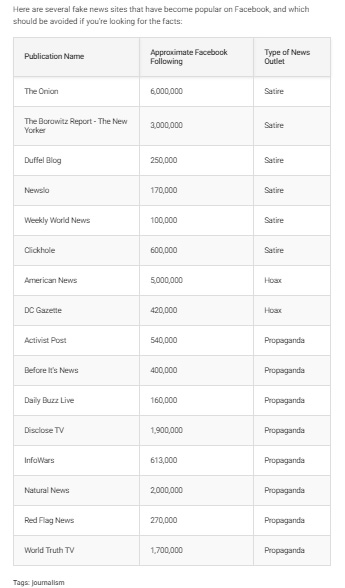
I spoke to a representative from one of the sites mentioned, Activist Post, who said:
The establishment seems desperate to regain control of the narrative after independent news outlets on this list appear to have tipped the election to Trump.
We believe that we’re being unfairly lumped in with deliberately fake websites like The Onion in an attempt to discredit alternative viewpoints of current events.
Another list put together by Melissa Zimdars, whose bio says she is ” an assistant professor of communication & media” calls the following websites “False, Misleading, Clickbait-y, and Satirical “News” Sources.”
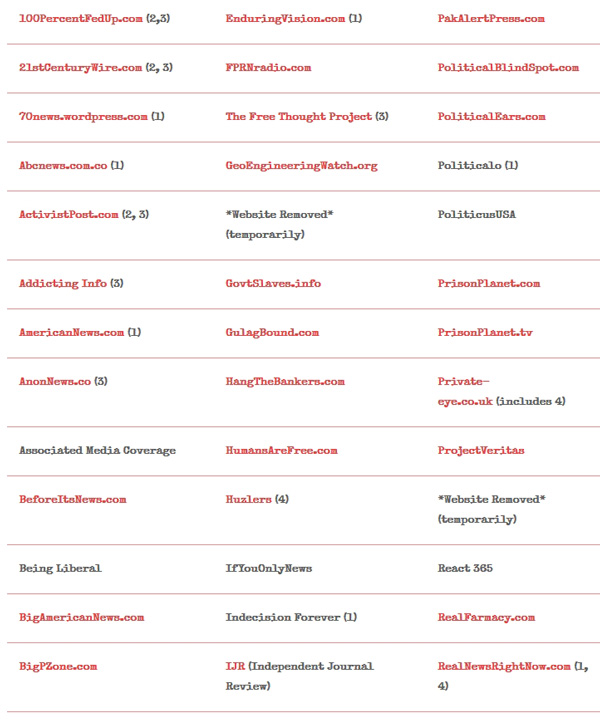
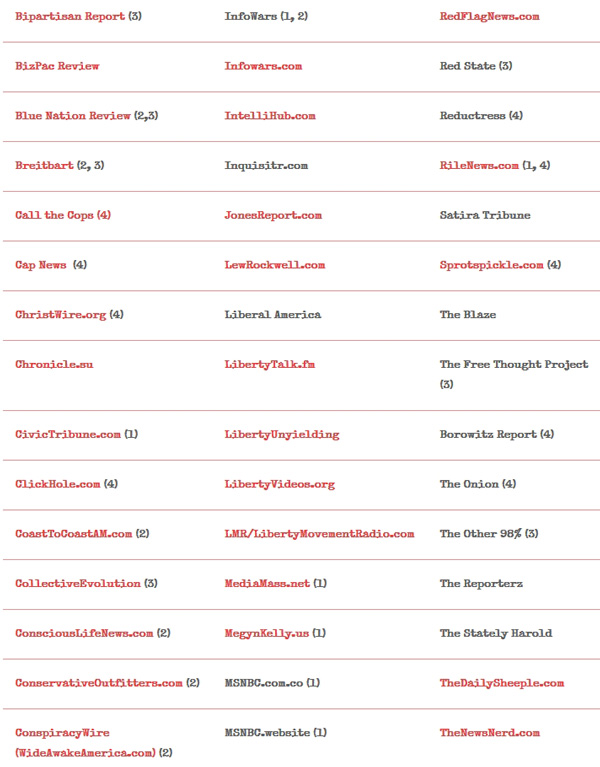
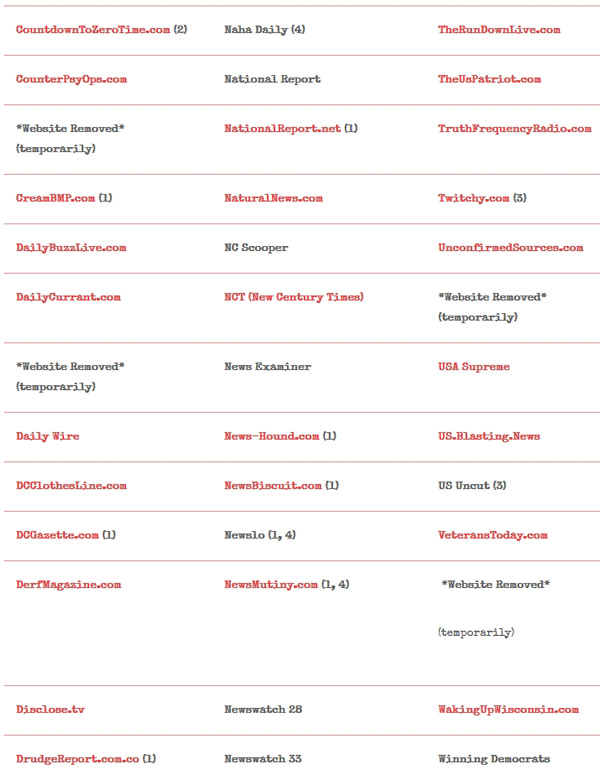
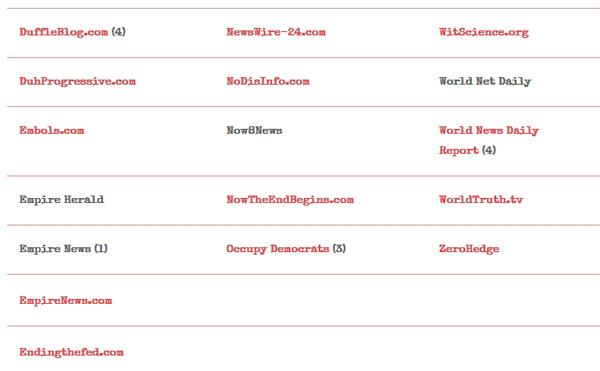
It’s important to note that the author of the list above recommends some of the most notably biased liberal publications around as trustworthy. She writes:
Some people are asking which news sources I trust, and all I can say is that I read/watch/listen very widely, from mainstream, corporate owned sources (The New York Times, The Washington Post, The Boston Globe, The Wall Street Journal, Forbes) as well as The Atlantic, National Public Radio, and various local and alternative sources with different political perspectives, some of which are included on this list.
If you thought the propaganda controlling the minds of the masses was bad before, just wait. You ain’t seen nothin’ yet.
Read more at: DaisyLuther.com

